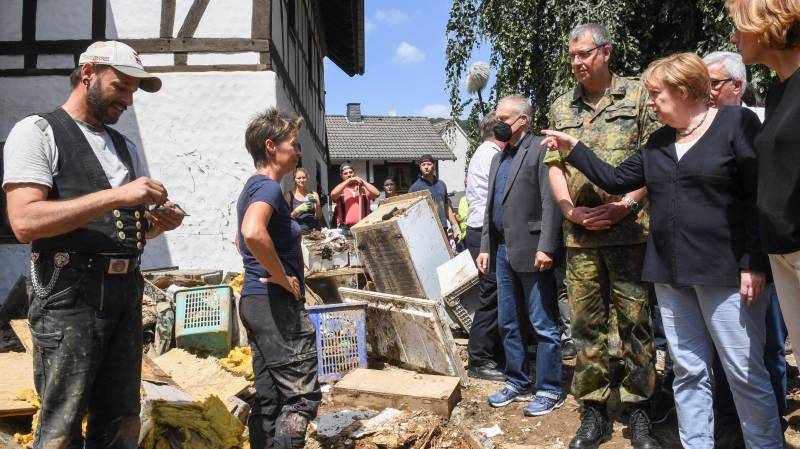Merkel visits 'surreal' flood zone as death toll rises

Stay tuned with 24 News HD Android App

Chancellor Angela Merkel said Sunday she was horrified by the "surreal" devastation in the flood-ravaged region of western Germany, as the death toll in Germany and Belgium passed 190 with dozens of people still missing.
The veteran leader said the world must step up efforts to tackle the climate crisis, as global warming makes extreme weather events more likely.
"We must hurry," she said. "We have to be faster in the fight against climate change."
Wearing hiking boots and offering pandemic-safe fist bumps to rescue workers, Merkel walked through the village of Schuld in Rhineland-Palatinate state, one of the two hardest-hit regions in western Germany.
She listened to the accounts of residents where the swollen Ahr river swept away houses and left debris piled high in the streets.
Merkel, who is retiring from politics after September's elections, described the damage as "surreal" and pledged quick aid to rebuild.
"It is shocking -- I can almost say that the German language doesn't have words for the destruction that's been wreaked," she said.
At least 160 people have died since Wednesday in Germany's worst flooding in living memory, police said.
Merkel was accompanied by Malu Dreyer, premier of Rhineland-Palatinate which has recorded 112 fatalities.
As they navigated damaged roads together, the chancellor gripped the hand of Dreyer, who has multiple sclerosis, to support her.
At least 31 people have lost their lives in neighbouring Belgium.
Heavy rainfall has also battered Switzerland, Luxembourg, the Netherlands and Austria in recent days.
Climate spotlight
The disaster has catapulted climate change back to the top of the agenda in Germany, ahead of September 26 polls that will mark the end of Merkel's 16 years in power.
Experts say that because a warmer atmosphere holds more water, climate change increases the risk and intensity of flooding from extreme rainfall.
Armin Laschet, the premier of flood-stricken North-Rhine Westphalia (NRW) state and frontrunner in the race for the chancellery, said global warming should be tackled "faster and more consistently".
"The climate won't tolerate a delay," he said.
Laschet's campaign suffered a setback however after he was filmed laughing in the devastated town of Erftstadt in NRW on Saturday, while President Frank-Walter Steinmeier was giving a statement expressing his sympathies to grieving families.
Laschet later apologised, saying he had been deeply moved by the suffering of residents and his behaviour in that moment "was not OK".
Weather warning criticism
The scale of the flood impact in Europe's top economy was gradually becoming clear, with damaged buildings being assessed and efforts underway to clear debris and restore gas, electricity and telephone services.
In some areas, police deployed speedboats and divers to retrieve bodies.
The clean-up is expected to take months, "even years", said Laschet.
The high death toll brought scrutiny to Germany's weather alert system and whether people in the risk zones were notified early enough.
The German association of cities and towns called for "significant reinforcements" to emergency preparedness and warning systems.
Economy Minister Peter Altmaier told the Bild daily that lessons had to be learned.
"Did we take enough precautions to recognise these kinds of events in time?" he asked.
With the waters receding in Rhineland-Palatinate and neighbouring NRW, attention shifted to Germany's Bavaria region where more rain was forecast later Sunday.
One person died in Upper Bavaria on Saturday after heavy downpours inundated basements and led rivers and creeks to burst their banks.
In the eastern state of Saxony, authorities reported a "significant risk situation" in several villages.
German Finance Minister Olaf Scholz pledged more than 300 million euros ($354 million) in emergency aid for people who lost homes and businesses, with the cabinet to approve a much larger reconstruction package on Wednesday.
The final bill is expected to run in "the billions" of euros, Scholz said.
Helping out
Heinz Gies, 50, a resident of badly hit spa town Bad Neuenahr-Ahrweiler, said he had just completed a partial renovation of his house, which is now caked in mud.
"But the neighbours are helping each other out and there are so many volunteers here bringing us water, ice cream, coffee and everything else we need," he told AFP.
Local authorities in NRW and Rhineland-Palatinate said dozens of people remained unaccounted-for, possibly due to communication disruptions.
Dozens were also still missing across the border in Belgium, where police were going door to door in flood-stricken areas to check on residents.
